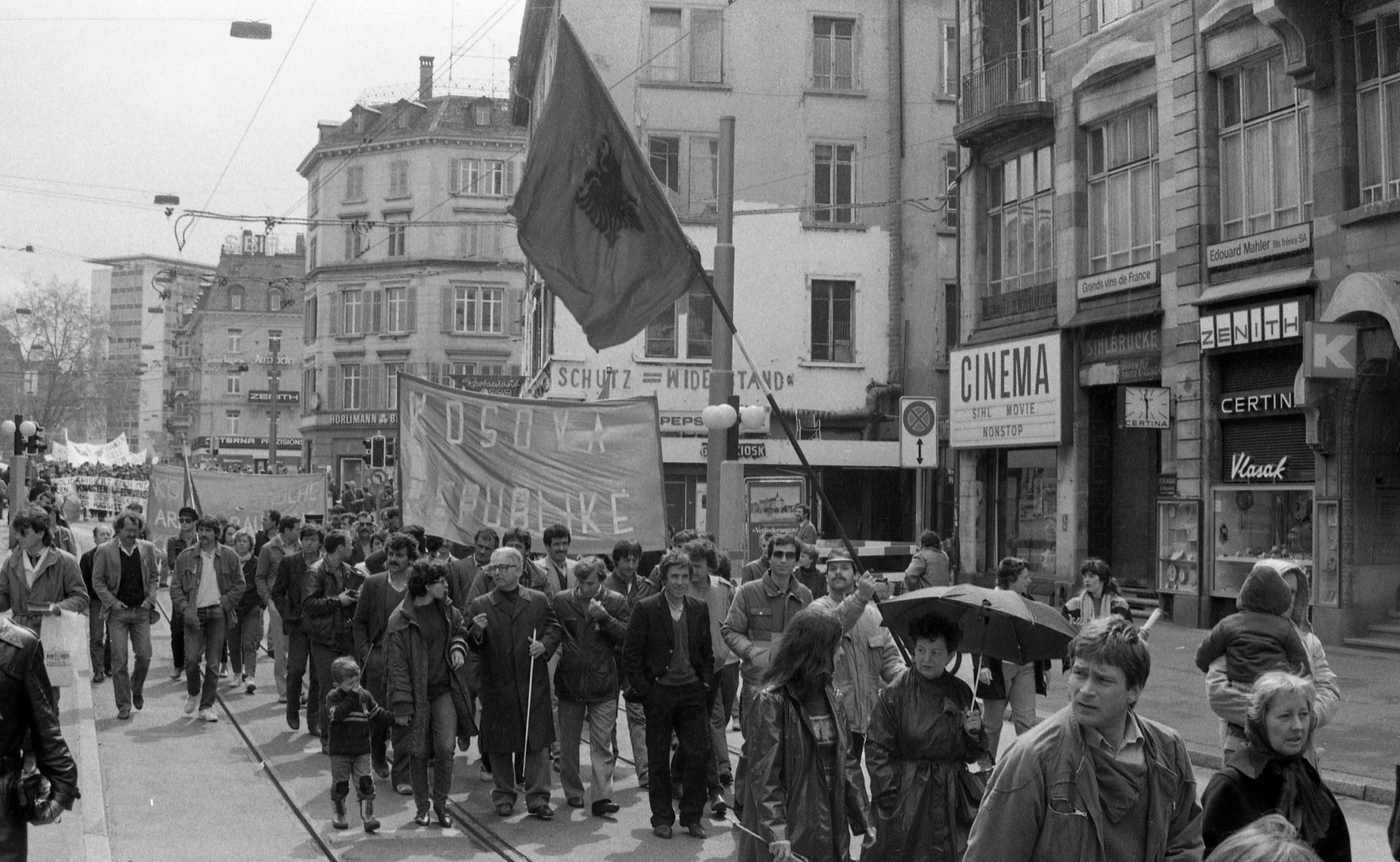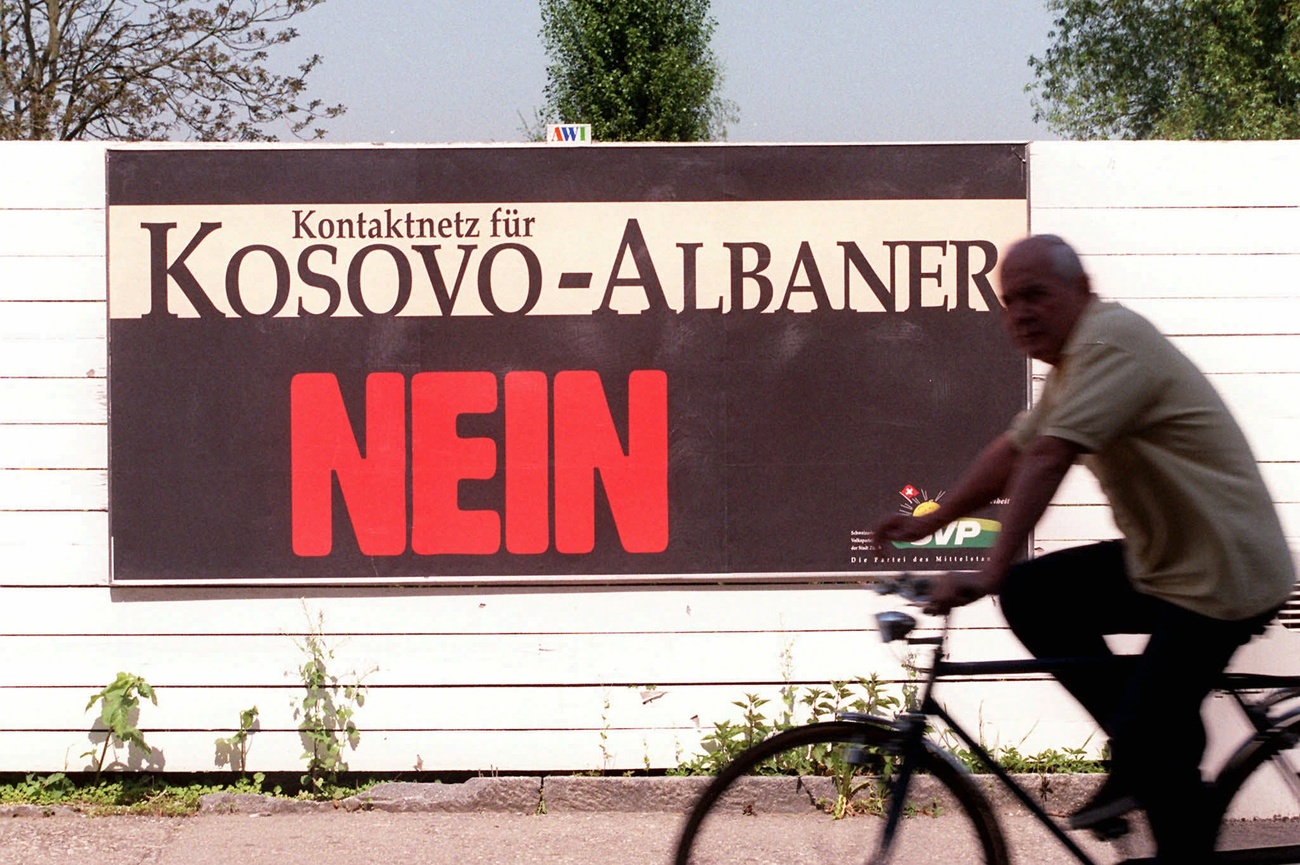
Kosovo and Switzerland: an intense relationship
For a long time, Kosovars remained invisible in Switzerland. In the 1990s they were victims of racist stereotypes. Today there are a lot of connections. A look at how the two countries have grown together.
Kosovo is sometimes described as the 27th canton of Switzerland. There are 1.8 million Kosovars living in Kosovo and 250,000 in Switzerland. Relations have been close ever since Switzerland played a key role in the young state’s independence in 2008.
Links between the two countries date back to Switzerland’s drive to recruit labour from the former Yugoslavia in the 1960s. Between 1965 and the mid-1970s, between 300 and 1,800 workers a year came to Switzerland from the poorer regions of Yugoslavia – many of them from Kosovo, where the labour office reportedly sent people directly to Switzerland. Most of them worked on farms here. A father was often followed by his son or nephew. Entire family trees were transplanted.
The labourers lured to Switzerland had no intention of bringing their families with them. Since the Ottoman Empire, Kosovar men had gone in search of an income abroad. “Gurbet”, or labour abroad, is still the subject of bitter songs: “Aman, Aman, Germany and you, lonely Switzerland, cheated me in my youth, what use is all this wealth to me.”
Wages were sent back to the extended family in Kosovo, to whom they wanted to return. As so-called “guest workers”, Kosovars in Switzerland moved from one work permit to the next. They often did not return to their homeland for years, if at all. In Switzerland, they lived modestly, frugally and discreetly, and were almost invisible. Kosovo itself was, for a long time, just the description of a landscape – not a country or region.
Kosovo appears on the map
In 1981, students in Kosovo revolted, first against terrible food in the canteen, then in favour of Kosovo becoming an independent republic within the multi-ethnic state of Yugoslavia, independent of Serbia.
In the same year, 300 demonstrators in Zurich also called for a Republic of Kosovo. They denounced the brutality of the Yugoslav state against their minority. “Where I live, nobody knows I am Albanian – we are very careful,” one activist said in an interview at the time with the left-wing Wochenzeitung newspaper. He reported on the reprisals they had to fear – from prison to torture to death.
In Europe, Kosovo’s conflict with the rest of Yugoslavia was long seen as a shift towards the Stalinism of neighbouring Albania. It was a way of reducing it to terms understandable for the Swiss. In 1984, a participant at another rally was quoted in a Swiss newspaper: “To put it in a Swiss context, we simply want our own canton.”

In the 1980s, the number of Kosovar asylum seekers in Switzerland rose steadily. The numbers are not precisely recorded; Kosovars appear in the statistics as Yugoslavs. While it was primarily activists who fled initially, by the late 1980s the original Kosovars in Switzerland began to bring their families, even though that was never the plan.
The situation seemed too hopeless for them to return in the short term. In the late 1980s, Slobodan Milosevic, the last president of Yugoslavia before the civil war, declared Kosovo to be the decisive battleground in Serbia’s nation-building process. He snatched away the region’s right to manage its affairs autonomously, which it had enjoyed since 1974. A state of emergency was declared and a two-tier society was established.
The Kosovar media was brought into line, schools now taught according to the Serbian curriculum, and the Albanian language was marginalised. Access to the healthcare system was made more difficult for Kosovars and they were forced out of the state economy and administration – which, in a socialist country meant immediate, persistent unemployment and poverty. Anyone who wanted to continue working had to sign a declaration of loyalty to the Serbian state, although almost no one could bring themselves to do this. Mass demonstrations against this apartheid policy were brutally suppressed.
The KLA in Swiss uniforms
The Kosovars founded their own schools, television stations and healthcare centres. A whole parallel society emerged, strongly supported by money from the diaspora that was paid into a Swiss numbered account. In 1991, the state of Kosovo was proclaimed, unilaterally, for the first time. But it received no international recognition.
After the Yugoslav wars, the Dayton Agreement ended the war in Bosnia and Herzegovina in 1995. But no account was taken of the Kosovo issue. Separation from Serbia was a distant prospect. For a long time, the fight for a free Kosovo was carried out non-violently by Ibrahim Rugova’s Lidhja demokratike e Kosoves (LDK), or Democratic League of Kosovo.
However, Serbian oppression and the two-tier society continued unabated and Kosovars felt increasingly unrepresented by the LDK’s peaceful strategy. In the mid-1990s, the Ushtria Çlirimtare e Kosovës, the Kosovo Liberation Army (KLA), emerged from the resulting anger, mainly in rural communities. At the same time, a fund for donations called “Das Heimatland ruft” (The Homeland is Calling) was set up, which the diaspora used to collect money for war materiel, among other things, including in Switzerland. At times, the KLA is even said to have worn Swiss army uniforms purchased from armouries here.
The conflict with Serbia came to a head in 1998. In spring 1999, Serbian troops drove out a large proportion of the Kosovars. A total of 13,000 people died in the conflict in 1998 and 1999. Around 10,000 of the dead were Kosovars, and about 3,000 were Serbs and members of other population groups. Two neighbouring countries, Albania and Macedonia, took in 670,000 of the 860,000 refugees. Over 43,000 applied for asylum in Switzerland. The only country which took in more asylum seekers was Germany, which is 10 times the size and gave refuge to 53,000 people. However, most of those who applied for asylum in 1999 returned after NATO bombarded Serbia from March to June 1999.
Swiss German in Pristina
In the 1990s, Kosovars fled to a Switzerland that was in recession and struggling to say farewell to the Cold War order.
The right-wing Swiss People’s Party, in particular, was in search of new enemies. As early as 1998, an outcry erupted over a poster in Zurich, in which the party attacked a contact network for Kosovar Albanians designed to put the growing community of refugees in touch with each other.

In the 1990s, the invisibility of Kosovars came to an end – they became part of the political rhetoric and were rumoured to be drug dealers and knifemen. The Swiss image of the Kosovar diaspora has improved over the past 20 years: without Kosovar players such as Xherdan Shaqiri or Granit Xhaka, the Swiss national football team would hardly ever make it past the preliminary rounds, and all the political parties are now trying to woo naturalised Kosovars.
According to 2021 figures from the Federal Statistical Office, 285,000 people in Switzerland speak Albanian at home. The majority of them come from Kosovo. Conversely, it’s not unusual to hear Swiss German in Pristina in summer, when the “Schatzis,” as the German-speaking Kosovars from the diaspora are called, visit their second home.
Edited by Mark Livingston. Translated from German by Catherine Hickley

























You can find an overview of ongoing debates with our journalists here . Please join us!
If you want to start a conversation about a topic raised in this article or want to report factual errors, email us at english@swissinfo.ch.